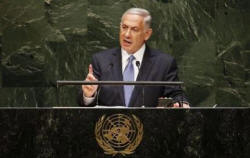|
 Amid
differences, Israel's Netanyahu to seek reassurances from Obama on Iran Amid
differences, Israel's Netanyahu to seek reassurances from Obama on Iran
 Send a link to a friend
Send a link to a friend
[October 01, 2014]
By Matt Spetalnick
WASHINGTON (Reuters) - President Barack
Obama and Israel’s Benjamin Netanyahu meet for a new round in their
often-tense relationship on Wednesday, facing differences over Iran
diplomacy and Middle East peace efforts as well as complications from
the U.S.-led fight against Islamic State militants.
|
|
 Hosting the Israeli prime minister in a brief visit to Washington,
Obama is expected to try to find common ground with Israel, a
traditionally close ally, on the most pressing issues but may have a
difficult time narrowing the gap. Hosting the Israeli prime minister in a brief visit to Washington,
Obama is expected to try to find common ground with Israel, a
traditionally close ally, on the most pressing issues but may have a
difficult time narrowing the gap.
Netanyahu has set Iran as his top priority in the White House talks.
He will seek Obama’s assurance that he will stick to his pledge that
“no deal is better than a bad deal” in Tehran’s nuclear talks with
world powers aimed at reaching a final agreement in November, an
Israeli official said.
While Obama probably will try to ease Netanyahu’s suspicions about
diplomacy with Iran, the U.S. president will stop short of meeting
the Israeli demand that Tehran be required to completely dismantle
its nuclear capability under any comprehensive accord, a U.S.
official said.
At the same time, Netanyahu is expected to use the Oval Office
meeting to continue sounding the warning he issued in his speech at
the United Nations this week – that a nuclear-armed Iran would pose
a far greater threat than Islamic State fighters who have seized
swathes of Syria and Iraq.

An Iranian U.N. delegate accused Netanyahu of "propagating
Iranophobia and Islamophobia."
Though Israel backs Obama’s efforts to forge a coalition to confront
Islamic State, some Israelis fear that world powers could go easy on
Shi’ite Iran’s nuclear program so that it will help in the fight
against the Sunni Islamist group.
“The president will make clear even with the international focus on
combating ISIL, that this does not in any way lessen his commitment
to preventing Iran from acquiring a nuclear weapon,” the U.S.
official said.
There could also be lingering strains between Obama and Netanyahu in
their first face-to-face meeting since the collapse of
U.S.-sponsored peace talks with the Palestinians in April.
Washington has blamed both sides, but Israel has bristled over U.S.
complaints that continued settlement building in the occupied West
Bank contributed to the diplomatic failure.
Obama appeared to chide the right-wing premier, who has a history of
rocky relations with the U.S. president, in his own U.N. address on
Wednesday when he lamented that "too many Israelis" were ready to
abandon peace efforts. He insisted that the status quo with the
Palestinians was “unsustainable.” LOW-PROFILE VISIT?
Despite that, U.S. and Israeli officials alike may prefer to keep
tensions under wraps for the relatively low-key visit.
[to top of second column] |

Obama and Netanyahu are due to meet at 11:20 a.m., and their only
joint appearance will be statements to a small pool of journalists
at the end. The last thing the White House wants is a repetition of
a 2011 Oval Office visit when Netanyahu famously lectured Obama on
the long struggles of the Jewish people.
There is also little expectation that Obama will use the talks for
any serious push for renewed negotiations in the aftermath of a
50-day Gaza war between Israel and the Hamas militants, which ended
in August with no clear victor.
But the U.S. official said: “The top of our agenda (for the meeting)
is current relations between Israel and the Palestinians, including
the situation in Gaza.”
That is at odds with Netanyahu’s plan to focus first and foremost on
Iran, whose nuclear program he considers an existential threat to
Israel. Iran, Israel’s arch-foe in the region, denies it is seeking
nuclear weapons capability. Israel is widely assumed to have the
Middle East’s only atomic arsenal.
While Israel wants Iran stripped of its nuclear capability,
Washington has left the door open to a deal that would allow Iran to
retain limited uranium enrichment for civilian purposes.
“The prime minister won’t be making demands of Obama or asking for
public clarification,” said the Israeli official, a participant in
U.S.-Israeli discussions on Iran. “But given Israel’s worries about
the direction of the negotiations with Iran, we would like to get
reassurances.”
Iran and six world powers ended 10 days of talks in New York last
week that made little progress in overcoming disagreements on issues
such as the future scope of Tehran's nuclear program and the speed
of lifting sanctions. The talks are aimed at getting a long-term
agreement by a Nov. 24 deadline.
(Additional reporting by Dan Williams and Jeffrey Heller in
Jerusalem; Editing by Ken Wills)
[© 2014 Thomson Reuters. All rights
reserved.] Copyright 2014 Reuters. All rights reserved. This material may not be published,
broadcast, rewritten or redistributed.
 |